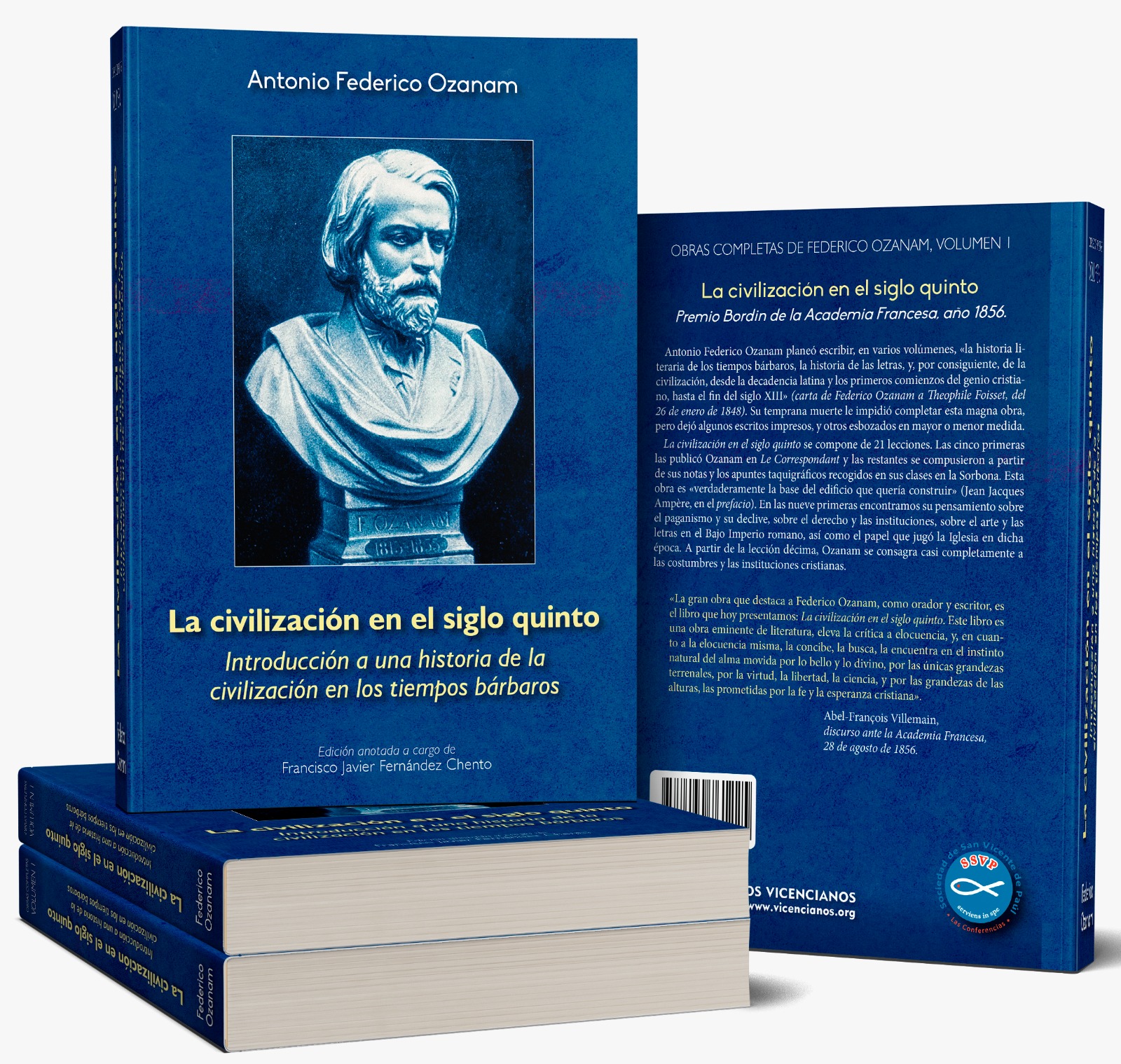With the support of the International Commission for Historical Research of the Society of Saint Vincent de Paul and the National Council of the Society in Spain, the first volume of the Complete Works of Frederic Ozanam has been published in Spain. This publishing project is very ambitious and will take several years to complete: the collection with gather together all the writings of Blessed Frederic and will bring the Spanish-speaking members of the Vincentian Family closer to the wisdom, knowledge and spirituality of the primary Founder of the Society.
Jose Manuel Buergo, president of the Historical Commission of the Society, in the Introduction to the first volume, states:
We want to recover and make known the fundamental texts (including those of Frederic Ozanam, the primary Founder) that have forged our history, as a Catholic institution that serves those person who are most in need.
Frederic is a model of life at the service of goodness and truth, a man of the Church, an relentless apologist, who knew how to interpret and give continuity — as few lay people have done — to the teachings of Saint Vincent de Paul.
Frederic Ozanam’s writings are full of beautiful texts of various kinds. Those related to his attitude towards social justice are very relevant and unfortunately, many of them are still unknown. The problems and conflicts that Frederic Ozanam experienced in his time are, in many ways, identical to those we experience today, more than a century and a half later.
Frederic was a tireless popularizer in defense of Christianity. He did not confine himself to exposing the problems of society, but offers solutions and encourages everyone, especially his friends, to engage in actions on behalf of the most oppressed (he did this in his writings and also in his life). Frederic understood that God would bless people if they gave witness to the faith through charitable works … and one of the greatest works of charity is the proclamation of the Gospel to the world.
The book in your hands is a carefully reviewed and profusely annotated edition by the publisher, who has done extraordinary work to facilitate its reading and understanding. The title, chosen by Ozanam himself before dying, can lead to confusion. Ozanam is not simply detailing the fall of the Western Roman Empire … a decline which began when Romulus Augustulus, the last Roman emperor of the West, was deposed in 476, rather Frederic goes much further. This work contains the twenty-one lessons that he taught at the Sorbonne on the matter. Even though these lessons focused on this important date in the history of humanity, they cover a much longer period, and they refer to many aspects of Roman social life and culture, highlighting the beneficial influence that Christianity had for the construction of the new society, born from the ruins of the fallen Empire, as well as for the preservation of knowledge, ancient customs and culture.
This first recently published volume corresponds to the work “Civilization in the Fifth Century”, Ozanam’s posthumous work that transcribes the lessons he taught from his chair of foreign literature at the Sorbonne, during the years 1848 and 1849. These lessons were transcribed by a stenographer and, as explained in the preface, was reviewed by several of his friends. This work received the prestigious Bordin Prize from the French Academy in 1856.
Javier F. Chento, editor of the work and annotator of this first volume, states in his foreword:
The general purpose of this work is explained by Ozanam himself in the prologue: to show how Christianity helped to develop a new society that was “capable of upholding the truth, doing good, and finding beauty.” In this new society, which was born from the ruins of the Roman Empire, the Church was the great civilizing force that survived the fall of the Empire, preserved ancient knowledge, and fostered the building of Western civilization.
A superficial look at the text is enough to understand Ozanam’s vast knowledge of the subject: it is evident that he knew similar studies that were published by his predecessor and contemporary authors. It is also clear that he was familiar with the writings of the Ancient and Middle Ages, the history of the Church, the works of the Holy Fathers and other early Christian texts, etc.
Ozanam, in twenty-one lessons, developed various aspects of the historical reality surrounding the fall of the Western Roman Empire. The first three lessons present an overview of the subject matter. He then speaks about paganism and its decline (fourth and fifth lessons); Roman law and the contributions of Christianity to said law (sixth lesson); pagan literature, literary traditions and how they were incorporated into Christianity (seventh to ninth lessons); the theology and Christian philosophy of that era (tenth and eleventh lessons); Christian institutions and customs (twelfth and thirteenth lessons); a lesson dedicated to showing how Christianity dignified women (fourteenth lesson); the contributions of Christianity to the Latin language (fifteenth lesson); four lessons devoted respectively to eloquence, history, Christian poetry and art (sixteenth to nineteenth lessons); the material civilization of the Empire, under three aspects: trade, agriculture and cities (twentieth lesson); the final lesson explains the rise of neolatin nations and languages (twenty-first lesson). We become involved in a long and, without a doubt, dense journey, during which Ozanam presents us with much historical data as well and many quotes and references.
Copies can be requested from the National Council of the Society of Saint Vincent de Paul in Spain at: ssvp@ssvp.es
Hopefully this example will impact others and we can have Frederic’s writings published systematically in many other languages!








0 Comments